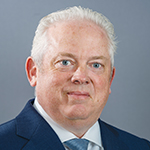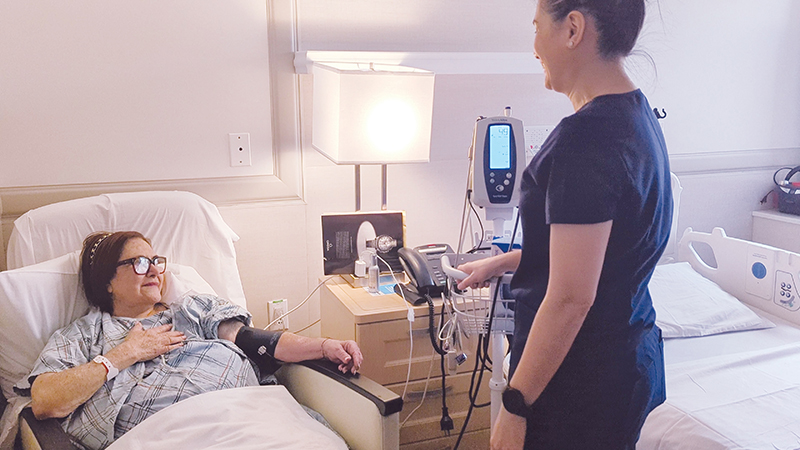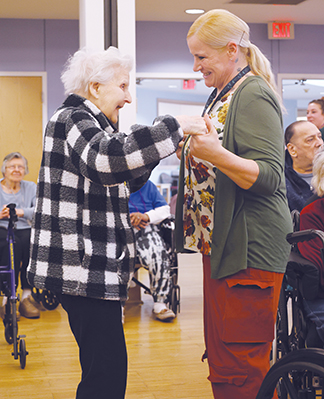
Executives at Catholic health systems that provide long-term care say while they support the goals of new federal staffing mandates for nursing homes, they see a disconnect between the goals and the rules.

Scott LaRue, president and CEO of New York-based ArchCare, noted that the mandates finalized April 22 by the Biden administration largely ignore the ongoing funding and workforce challenges vexing long-term care providers.
"They're not part of the solution to solve those problems," LaRue said. "I find the whole thing very problematic and superficial in the approach."
In its announcement, the White House said the rules fulfill the president's commitments to give Americans access to safe long-term care and to promote quality in caregiving jobs.
"Medicare and Medicaid pay billions of dollars per year to ensure that 1.2 million Americans that receive care in nursing homes are cared for, yet too many nursing homes chronically understaff their facilities, leading to substandard or unsafe care," the announcement said. "Understaffing can also have a disproportionate impact on women and people of color who make up a large proportion of the nursing home workforce because, without sufficient support, these dedicated workers can't provide the care they know the residents deserve."
The mandates, which begin to phase in in August, are documented in a 125-page document post by the Centers for Medicare & Medicaid Services. The agency said the mandates are based on evidence collected since 2016 and lessons learned during the COVID-19 pandemic. Along with many other specific requirements, long-term care facilities that receive Medicare and Medicaid funding must:
- Have registered nurses on-site around the clock.
- Have 3.48 hours per resident per day of total staffing, of which 0.55 hours per day must be from registered nurses and 2.45 must be from nurse aides. The remaining 0.48 hours can be from any combination of nurse or aide staff.
LaRue pointed out that the federal mandates are similar to rules passed in 2021 in New York state, where ArchCare has seven nursing homes with a total of 2,100 beds. He said industry associations have estimated that 75% of the state's about 600 nursing homes are not meeting mandates.
"The legislators were very proud of the work that they did, and they had committed to funding them," LaRue said. "Of course, they have not funded it. In order for (ArchCare) to meet the staffing mandate, I would need another $22 million in revenue."
LaRue and others who have reviewed the federal staffing mandates noted that the rules do not come with the promise of any enhanced funding to recruit, train or pay staff.

From problem to crisis
Allison Q. Salopeck, president and CEO at Jennings, said she understands the desire to crack down on the "bad players" who run nursing homes with inadequate staff. But she said the staffing mandates have the
potential to be devastating across the board for long-term care providers.
"You look across the country, and we're not talking about a workforce crisis and lack of nurses and lack of nursing home workers as a result of trying to stop this staffing mandate," said Salopeck, whose system is based in suburban Cleveland. "We've been talking about this because it's a real problem that started before the pandemic and got to crisis level during the pandemic."
Salopeck is particularly concerned about the specific breakdown of the staffing requirements. She said while the mandates set specific requirements for registered nurses, they lump the care of licensed practical nurses in with that of nurse aides. The rules, she said, fail to acknowledge that LPNs are the backbone of long-term care in the United States.

"What this does is it really flips us from staffing with mainly LPNs to needing to staff with mainly RNs," she said. "And they're just not out there."
Salopeck also pointed out that the rules are singularly focused on the medical needs of people in long-term care. The mandates make no mention of or allowances for staffing to meet the other aspects of the holistic care that Jennings and other Catholic providers offer, such as pastoral care and social services. "I think it's a real mistake to have ignored all of those," she said.

'Ill-advised' mandate
In its statement on the staffing regulations, CHA expressed disappointment that the final version "establishes an ill-advised staffing mandate" and sets hours requirements at a time when nurses are scarce.
"We are deeply concerned that the new staffing mandate could actually harm residents and nursing facilities, which will have to leave beds empty or even close if there are not enough nurses to meet the mandate," CHA said. "Vulnerable seniors will have even less access to the quality care they need."
The American Health Care Association and the National Center for Assisted Living estimate that more than 1,000 nursing homes have closed since 2015. Of those, 579 closed during the pandemic and displaced 21,508 residents. Meanwhile, the U.S. Census Bureau says the senior population that long-term care facilities largely serve saw its fastest growth in more than a century from 2010 to 2020, to 16.8% of the population, and that growth is continuing.
LeadingAge, the association of nonprofit, mission-driven providers of aging services, also has taken issue with the mandates. Katie Smith Sloan, LeadingAge president and CEO, sent a letter to President Joe Biden expressing dismay over how, in the rollout of the rules, the administration disparaged nursing homes, depicting them as neglectful of patients and their management as indifferent to direct care workers. She also warned of the mandates' potential effects.
"These new minimum staffing requirements, which come with no additional funds for recruitment, training, or support for increases in Medicaid reimbursement (the main source of nursing homes' funding), will likely result in unintended consequences," Sloan wrote. "Older adults' and families' existing difficulties in accessing care will worsen. Already, staffing shortages have resulted in nursing homes placing holds on beds, closing wings, limiting admissions or — worse yet — shuttering entirely."

Costs and penalties
CMS estimates the average annual increase in costs from the staffing mandates at $4.3 billion over the next 10 years. However, Janine Finck-Boyle, vice president of health policy and regulatory affairs at
LeadingAge, said the organization calculated that meeting the mandates will require nursing homes to add about 27,000 registered nurses and 78,000 nurse aides. Its estimated annual cost to pay those workers is about $7 billion.
Meanwhile, Finck-Boyle pointed out that various factors such as immigration restrictions, lack of nurse educators and competition from others in the health care sector have resulted in a "dried up pipeline" for nursing home staff.
The CMS announcement of the mandates proposes a $75 million federal incentive program to bolster nursing home staff, money that Finck-Boyle said would come from monetary penalties on facilities for deficient practices, including failing to meet the staffing mandates. She noted the irony of turning the proceeds of fines for staffing deficiencies into incentives to address a workforce crisis that is itself making the staffing mandates unworkable.
Another quirk in the mandates that Finck-Boyle noted is that while facilities can file for waivers to give them more time to come into compliance, applications for the waivers can only be made after a facility has been cited for being out of compliance.
Finck-Boyle spent two decades in nursing home administration in the District of Columbia, which instituted staffing mandates in 2005. She said those mandates were challenging but manageable. She doesn't believe the federal rules are, given the dearth of available workers and the lack of increased financial support.
"It's an unfunded mandate, and I will say that all the time, an unfunded mandate without a pipeline of workforce," she said.

Viability in doubt
Jerry Carley, president and CEO of Benedictine, said almost all of the 33 long-term care communities his system operates in five Midwestern states already meet or exceed the overall staffing standard. But as
with other systems, the specific requirement for RNs and nurse aides is the challenge.
"In some of our rural communities, for example, we haven't had an RN applicant for two years," Carley said.
The shortage of nurse aides also is acute, he said, with Benedictine relying on high-cost agency staffing to fill positions. He said the worker shortages are worst in rural areas, where the Census Bureau says populations are disproportionately older compared to the rest of the nation.
"Now you throw the staffing mandate on top of it, and there's just a concern over what's the future viability of these small rural locations, as well as others," Carley said. "That's the piece that worries me the most."
Carley said the toll of the mandates could be especially harsh on Catholic facilities because of their vow to care for people regardless of means. Like other nonprofit care providers, Benedictine gets much of its funding for those residents from Medicaid.
"The federal government's going to have to step up and fund these mandates," Carley said. "They have to, because if they don't, there is a risk and a high probability that we'll see what we have seen over the last 10 or 20 years with the number of nursing homes closing."
